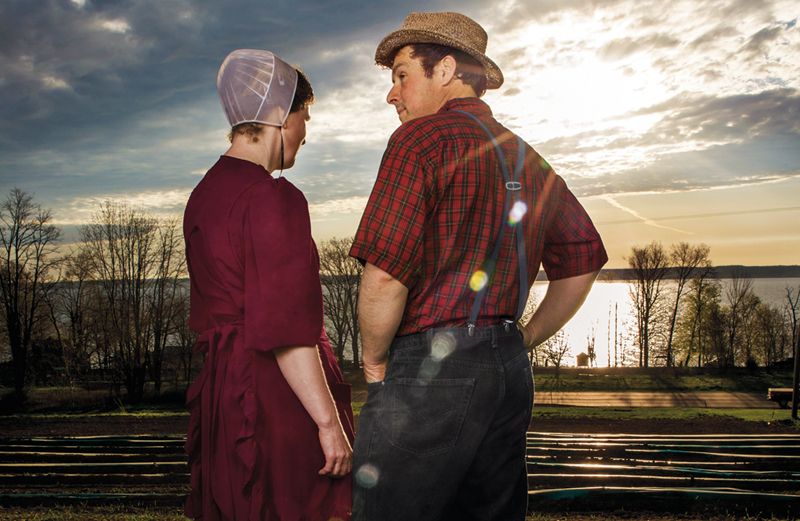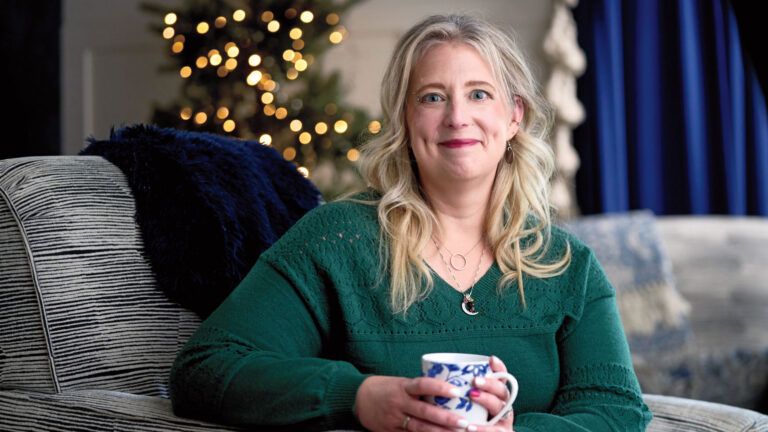A breathtaking morning on our dairy farm in Upstate New York. Sunlight was streaming through the windows of the big red barn. An orderly row of black-and-white Holstein cows placidly chewed their cud after their morning milking. It was almost like a painting—rustic, pastoral and peaceful.
I was anything but at peace. I stood numb, my hand over my mouth, as a white waterfall of fresh milk flooded down into the central drain of the barn. We had a herd of 40 cows but we couldn’t sell their milk.
Out of the blue, our milk processor, which buys milk from dairy farms and prepares it for resale to stores, had told us, “Your bacteria count’s too high. We can’t buy your milk anymore.” And that was that.
Watching the milk go down the drain was like watching the last of our dreams swirl away.
Actually, it was like watching money disappear. Which was all that had happened on our farm since my husband conceived the harebrained notion that our 120 acres, perfect for growing corn and other sensible crops, was really meant to be a dairy farm.
Ever the romantic optimist, Kenny envisioned a bucolic future of cows dotting the fields and enough income to enable him to close his construction business and live full time as a farmer.
That didn’t happen. Obviously. I blamed Kenny. And I blamed God.
Kenny is a faithful man, raised like all of us Mennonites to ground our lives, our work and our family in the Lord. Kenny did that—too much, in my opinion. I was the realist of the family. I kept the accounts. I knew when prayerful plans did nothing more than sap our income.
I tried not to say so out loud. But sometimes I wished Kenny would read his Bible less and listen to me more.
That’s what I was thinking while I watched that milk go down the drain. The cows didn’t know we couldn’t sell their milk. They still had to be milked every morning. We’d be throwing the stuff away every day until we found a new processor. If we found a new processor, I thought bitterly.
Word spreads fast in the dairy community. Once a farm’s cows get a bad reputation it’s hard to recover. We’d borrowed $100,000 to buy this herd. Every day not selling milk was a day not paying back that loan. We had six children and one more on the way. I was close to panic.
Just then, Kenny trotted into the barn, a bale of hay in each hand. He saw my stricken face. “Don’t cry over spilt milk,” he tried to joke. “There’ll be more tomorrow.”
I glared at him. His expression—resolute, optimistic—was no different than it had been that day 20 years before when he first set eyes on this farm. We were practically newlyweds then and I was only just beginning to learn that when Kenny felt a call from God, there was no stopping him.
To my eyes, the expanse of untended fields and depleted soil looked like a terrible investment. The land had been rented to various farmers for years and none of them had taken care of it. The farmhouse, more than a century old, was a wreck. The windows were broken and there were birds nesting in the chimney.
“Ach, that land,” neighbors warned. “Strange thing, rain always seems to bypass it.”
Kenny took no account of this. “God has plans for us here,” he assured me. We paid $130,000. A bargain, Kenny said, though I was the one who wrote the mortgage checks.
With the help of neighbors we gutted and refurbished the house. We held a barn raising and planted corn, soybeans, wheat and oats. We never made enough money to close the construction business. But we got by.
That wasn’t enough for Kenny. He cast around for another source of income. Six years after we bought the farm, he looked up from his Bible one morning—Kenny read Scripture wholeheartedly, just as he did everything else—and announced that we were going to buy a herd of dairy cows.
“For how much?” I demanded. We had a big argument over those cows. But like I said, once Kenny thinks an idea has been blessed by the Lord, he’s immovable. We bought the cows. And our troubles only multiplied.
A healthy black-and-white Holstein cow is one of the most beautiful sights on God’s green earth. Our cows weren’t healthy. We’d had to go to Quebec to find the right herd. The transport truck got stuck in a long line at the border. By the time the cows arrived, their udders were swollen. Right away some developed mastitis.
Then a drought struck. The neighbors were right about our land. We watched showers sweep toward us across Seneca Lake, pouring down rain everywhere— except our farm. Our cornfields shriveled up. Some acres didn’t produce a single cob. The crystal-clear spring that had supplied water for more than a hundred years slowed to a trickle and stopped.
Cows, we discovered, drink a lot of water. We had to pay a water truck to come twice a day. Still the cows were thirsty. Their thirst made them sicker. Some developed pneumonia. Kenny and I worked into the night dispensing shots, powders, pills. One by one the cows began to die. Our herd of 75 shrank almost by half. My heart was in my mouth when I opened the barn door each morning. How many cows would still be alive?
One morning I awoke to find Kenny sitting on the couch, a pool of lamplight illuminating the Bible he was holding.
“What are you reading?” I snapped.
I knew I should be glad my husband was such a faithful reader of Scripture. But sometimes his routine irked me. There he sat, reading, while I plunged out into the cold to check on the cows he’d insisted we buy.
“Job,” he muttered.
I stared at him. Was this another one of his jokes? Did he not know that I felt exactly like Job? I tried to bridle my tongue. I couldn’t.
“How can you sit there reading like that while our farm is falling apart?” I cried. “Look around. There are piles of laundry, dirty dishes, and the pump won’t pump enough water to do them.
"We stink because there’s no water for a shower. Our cows are dying. We’re heading for financial disaster. And you sit there reading about Job! Don’t you realize there’s a Job living right here in this house? Tell me when it’s going to stop, Kenny!”
Kenny looked up from his Bible. For once he didn’t have a joke ready. He stood up, pulled on his chore boots and headed for the barn. I slumped into a chair at my desk. On the desk was a stack of bills. I put my head in my hands. I was too exhausted to cry.
Not long after, the woman from the milk processor knocked on the door and delivered her bad news.
Well, I thought now, watching the last drops of milk disappearing down the drain, at least this will put an end to Kenny’s dairy-farm fantasy. You can’t have a dairy farm if you can’t sell your milk.
I looked around for Kenny and saw he’d gone to the hayloft. I followed him and for a moment I watched him flinging bales of hay. I felt a pang of guilt. I knew Kenny’s intentions were good. Maybe the problem was that Kenny was too good. Too reliant on God. Not realistic enough.
I brightened at the thought that our latest setback might make him more sensible. That night, I decided, we’d sit down with the account books and I’d show Kenny exactly what we faced. We’d come to an understanding.
The evening got busy and we didn’t end up looking at the books. The following evening, before we had a chance to sit down, the phone rang. Kenny picked up and, to my dismay, I realized he was talking to another milk processor. A local farmer-owned co-op.
How had they known to call here? There was only one explanation. Kenny had called them to see if they’d buy our milk. He hadn’t told me! The dairy-farm dream wasn’t dead after all.
My eyes hardened. In response Kenny winked good-naturedly. Oh, that man!
For a moment I was too angry to listen to the conversation. Then it sank in, what Kenny was saying.
“Wonderful!” he exclaimed. “You’re sure it’s no problem that we’re outside of your usual territory?” There was a pause. “That’s right, we’ve had some sick cows, but the healthy ones produce perfectly good milk.”
Another pause. “You’re a real answer to prayer. Yes, we’ll have good milk for you every day. I’ll be glad to sign a contract.”
When he hung up his face was almost boyish. But wary too. He waited for my reaction. I opened my mouth to let him have it but no words came out. I thought back to that morning when I lit into him for reading his Bible on the couch. Job.
Suddenly, like a voice speaking in my mind, I heard that name in a wholly new way. Not as an emblem of suffering, but as an example of faithfulness in the midst of suffering. Job never doubted God. And neither, I realized, had Kenny. I lowered my eyes. Who was the realist now? I wondered.
“I knew the Lord would come through for us,” said Kenny, crossing the room and taking me in his arms. I let my head rest on his shoulder. I let my whole self rest. In my good husband. In our good God.
Of course, farm life is never easy and we’ve had our share of troubles since then. But we still have our cows (all healthy now). We still sell our milk. And we have enough water for showers and dishes since we dug a second well.
Even the rain seems to fall on the farm more often than it used to. You could call that a miracle. But I’m too much of a realist for that. We rely on God. God sustains our farm and our souls. That’s all the reality we need.
Download your FREE ebook, Rediscover the Power of Positive Thinking, with Norman Vincent Peale





